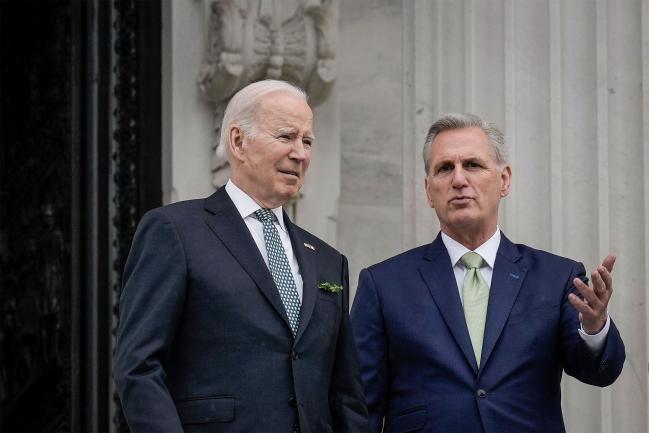(Bloomberg) -- President Joe Biden said he’d be glad to sit down with House Speaker Kevin McCarthy to discuss raising the US debt ceiling — if McCarthy took default off the table.
“I’m happy to meet with McCarthy, but not on whether or not the debt limit gets extended,” Biden said Wednesday during a press conference with South Korean President Yoon Suk Yeol at the White House. “That’s not negotiable.”
Biden and McCarthy are locked in a standoff over raising the US borrowing cap, fueling concerns about the possibility of a first-ever US default later this year. The speaker is pressing fellow Republicans to get behind a bill that raises the ceiling while slashing government spending — a link that Democrats have rejected.
McCarthy, who is aiming for a floor vote on his proposal as soon as Wednesday, tweaked his bill overnight, bowing to the demands of a small number of Republican lawmakers, and agreed to restore a few tax breaks for biofuels and investments.
That move came just hours after McCarthy declared to reporters he was not entertaining any changes to the measure, which would raise the US debt limit by $1.5 trillion. McCarthy told reporters Wednesday he’s now confident the bill would pass later in the day.
The White House has been cagey about whether Biden will agree to a meeting with McCarthy since the Republican speaker unveiled his proposal.
Biden has said he wouldn’t meet with McCarthy before he released a budget, but the White House has since signaled that he is holding out for Republicans to agree to an unconditional debt-ceiling increase.
The president on Wednesday pointed out that Republicans like to quote former Presidents Ronald Reagan and Donald Trump — and that both men supported raising the debt ceiling.
“I noticed they quote Reagan all the time and they quote Trump. Both of which said, I’m paraphrasing, it would be an absolute crime to not extend the debt limit,” Biden said.
The Treasury is due to soon release a new estimate of when they think the department thinks it will be on the precipice of breaching the debt ceiling and defaulting on federal payments.
Analysts expect that date to be roughly around late July, but have warned that sluggish tax-return revenues could advance the deadline to early June.

